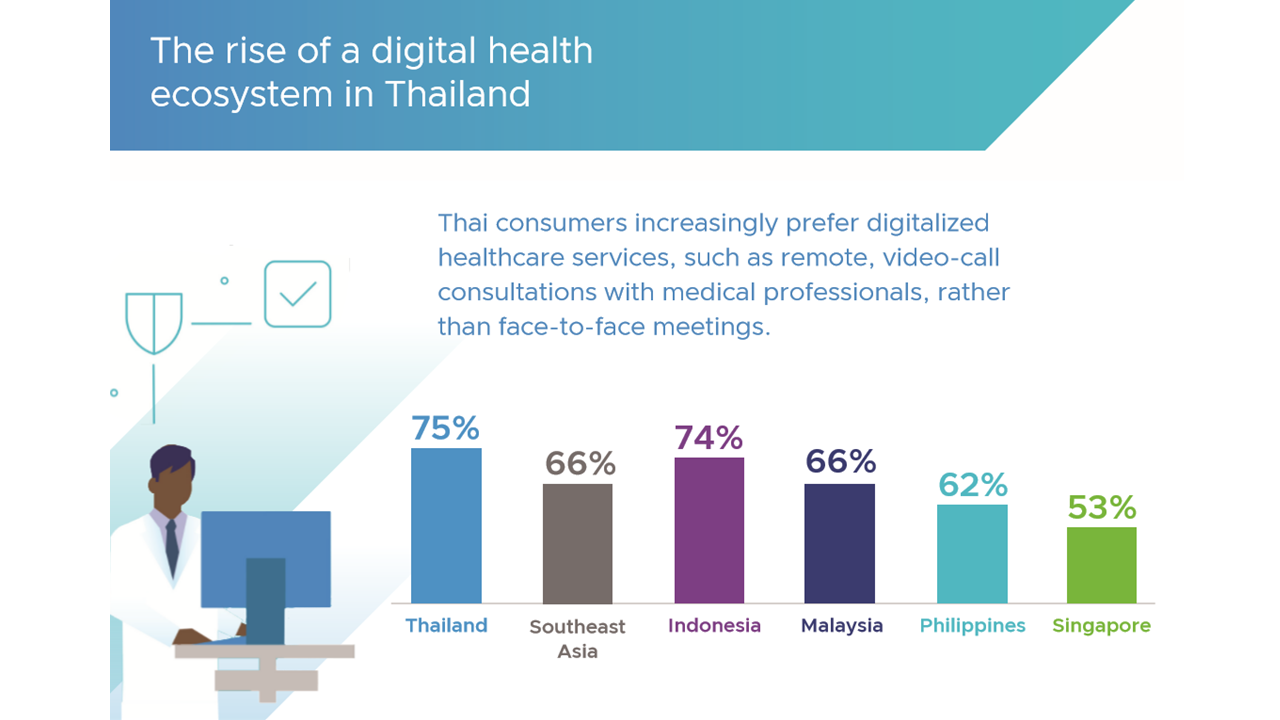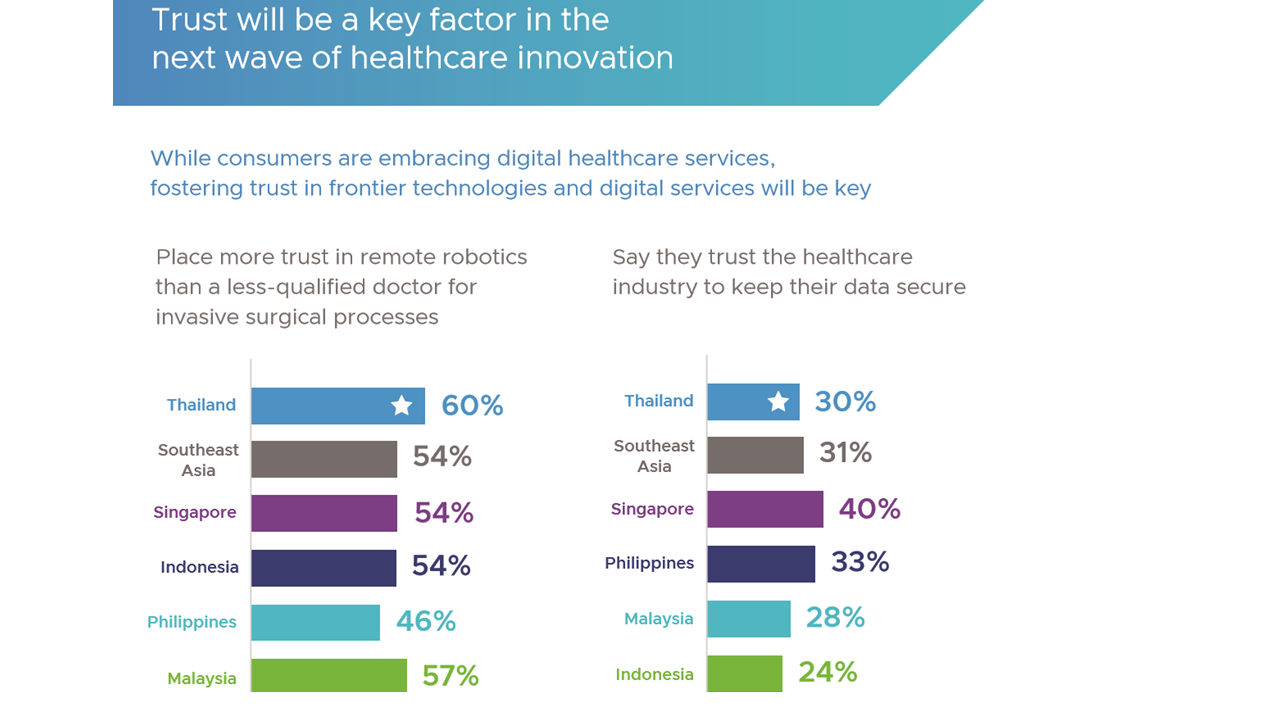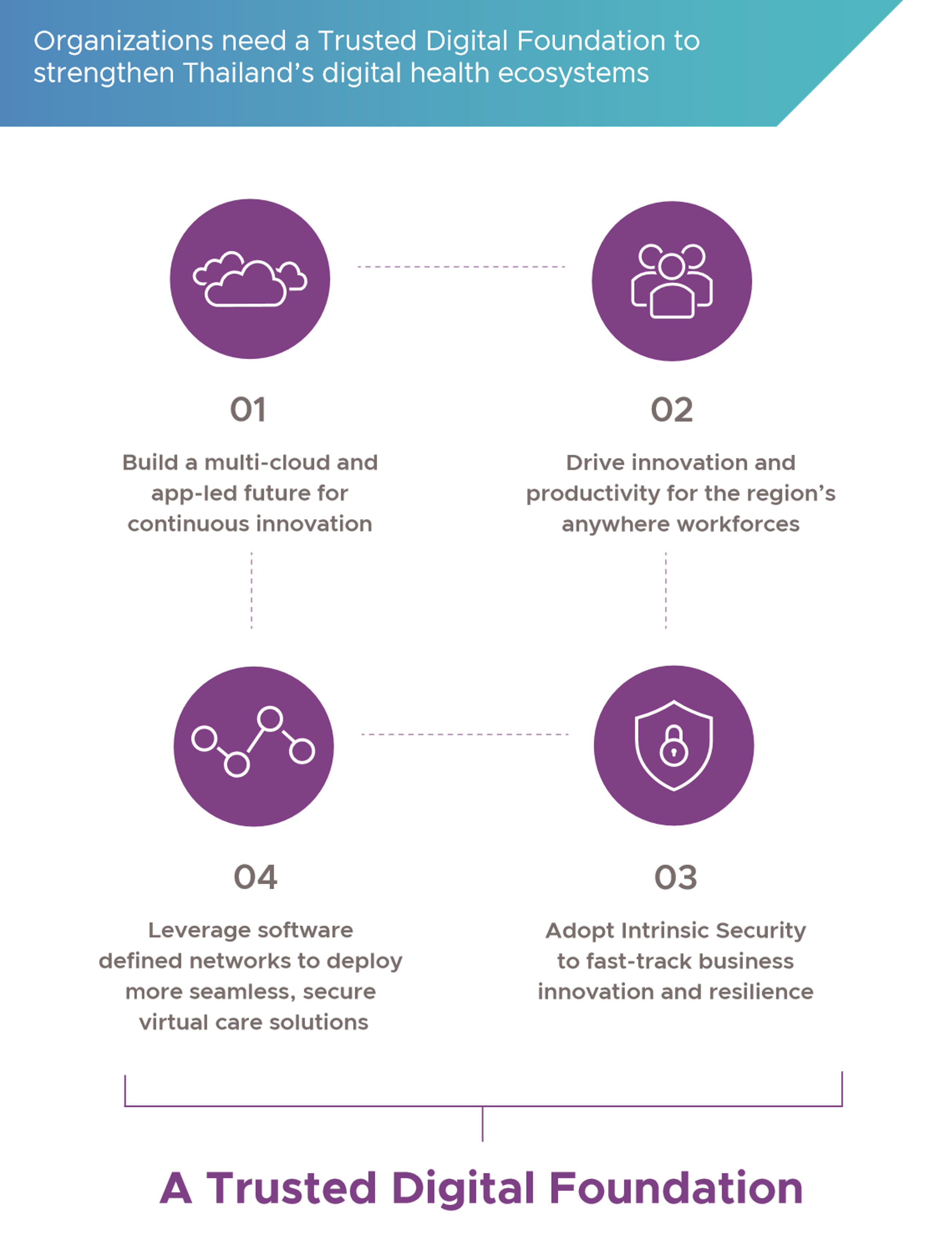- Patient-centric digital experiences will enable growth with 66% of Southeast Asians preferring remote, video-call consultations with medical professionals
- Region’s healthcare ecosystem needs to build a more robust digital foundation to accelerate innovations as Southeast Asians embrace technologies that detect anomalies better than human doctors (55%), conduct invasive surgeries via remote robotics (54%) and provide more freedom to patients with chronic and long-term illnesses (61%)
- Security is still key in building and sustaining digital trust in future of healthcare as only 31% of respondents say they think their data is safe with healthcare providers
Digital-first patient services and experiences are paving the way to Southeast Asia’s future healthcare landscape, according to VMware, Inc. (NYSE: VMW). In VMware’s Digital Frontiers 3.0 Study, VMware uncovered Southeast Asian consumers’ excitement for digital-enabled healthcare services with 66% of them saying they prefer remote, video-call in lieu of face-to-face consultations with medical professionals. With more patients increasingly expecting improved healthcare accessibility, timeliness and accuracies regardless of wherever and whenever they are, emerging digital healthcare innovations such as robotics and telehealth will be pivotal in shaping the future of digital healthcare in Southeast Asia.

- More than half (54%) say they are comfortable and excited to have a more qualified doctor conducting invasive surgery via remote robotics than a less qualified doctor conducting it in-person.
- This is higher than other surveyed counterparts: US (42%), France (43%), Germany (35%) and UK (46%).
- More than half (55%) are also comfortable and excited with receiving a diagnosis from a powerful computer that can learn to detect anomalies such as cancerous cells, rather than seeing a human doctor.
- 61% also believe that digital healthcare services can provide more freedom to patients with chronic or long-term illnesses as they can live further away from a medical facility by depending on sensors and real-time data monitoring to predict when they will require medical assistance.
Yet the same study also revealed that only 36% of Southeast Asian respondents are happy to interact with healthcare services providers digitally. To close the gap and drive greater digital healthcare adoption, healthcare industry incumbents and new entrants can tap on a more robust digital infrastructure and harness emerging technologies like Cloud, modern apps and big data to enable and provide better and more accurate healthcare services, charting a new future of connected healthcare for the region.

“New, immersive healthcare services such as remote medical consultations, wearable devices and supercomputers have redefined the way healthcare organizations and doctors interact with the patients and respond quickly to their needs – regardless of when and where they are. In the race for vaccines and other medical solutions, technology has also played an incredibly important role in tracking the spread, managing tests and improving the overall distribution flow,” said Ekpawin Sukanan, Country Manager, Thailand, VMware. “To build a resilient digital health ecosystem in Southeast Asia, VMware is committed to providing leading healthcare services providers in the region with a robust digital foundation to accelerate innovations, scalability and agility in patient care and clinical research.”
Future-forward technologies are transforming healthcare
Optimism for technology to provide solutions for health-related issues in Southeast Asia remains high as consumers believe that frontier technologies will be the key to offering a solution in the next decade:
- 82% believe that we could arrive at a solution to reduce the spread of Covid-19 – this is higher than other surveyed countries: US (59%), France (60%), Germany (58%) and UK (58%). 80% believe that technology can improve the quality of lives for the elderly and disabled.
- 76% believe that technology can help improve mental healthcare – for instance, enabling virtual therapy sessions.
- 74% believe that we can significantly lower the risk of invasive surgeries.
The innovation opportunity is ripe for Southeast Asia’s healthcare sector to leap forward, with consumers embracing technologies of the future including artificial intelligence (70%), 5G (78%) and facial recognition (75%). In fact, more than one-third of respondents (37%) have said that 5G will be key in enabling wearable devices to monitor their health in real-time, allowing medical professionals to be alerted and respond to any emergency.

In Thailand, resilient innovation and investment in medical tech and services have contributed to the rapid growth of the healthcare industry. More than 50 applications for investments in projects totaling $400 million dollars[1] were submitted in the first half of 2020 alone, according to the Thailand Board of Investment (BOI). This has contributed to the increasing embrace of future-looking healthcare services by Thai consumers:
- Over half (59%) are comfortable and excited to have a more qualified doctor conducting invasive surgery via remote robotics than a less qualified doctor conducting it in-person.
- 72% are also comfortable and excited with receiving a diagnosis from a powerful computer that can learn to detect anomalies such as cancerous cells, rather than seeing a human doctor – the highest in all countries surveyed.
- 68% believe that digital healthcare services can provide more freedom to patients with chronic or long-term illnesses as they can live further away from a medical facility by depending on sensors and real-time data monitoring to predict when they will require medical assistance.
Build and sustain digital trust in the next generation of healthcare
To unleash the possibilities that technology creates in changing the world of healthcare, healthcare organizations should address not only build trust in the next generation of healthcare innovations, but also consumers’ concerns of security and privacy.
With only 31% saying that the healthcare industry gives them the assurance their information is secure, the implication is clear for Southeast Asia’s healthcare organizations to secure digital health experiences and build up trust amongst consumers to accelerate their adoption and confidence in these new innovations.
Technology underpins next phase of growth for the industry
To accelerate the transformation of digital healthcare services in Southeast Asia, VMware outlines key priorities to note:
- Empowering healthcare organizations to build a multi-cloud and app future: Unlocking a multi-cloud future with app-driven innovations in a consistent and more secure environment that enables continuous innovation in the next generation of healthcare
- Enabling innovation and productivity for a distributed workforce: Future ready workforce solutions will enable a seamless and more secure digital employee experience, driving greater outcomes in the new world of work
- Intrinsic security for uninterrupted innovation: An intrinsic approach to enterprise security will provide an additional layer of robust protection for mission-critical infrastructures and patients’ personal data to build trust, fast-track healthcare innovation and resilience
- Software-defined, high-performing network for real-time analytics and monitoring: Move high-fidelity, latency-sensitive data to the cloud and between edge locations to offer rapid, more securely deployed, and easily accessed virtual care solutions

[1] COVID-19 Spurs Thailand’s Rise as Global Medical Hub, Thailand Board of Investment
